#phonics sound
Text
The Importance of Teaching Children to Read Through Letters and Sounds
Reading is a fundamental skill that serves as a cornerstone for a child's education and future success. It opens doors to a world of knowledge, imagination, and critical thinking. One of the most effective methods for teaching children to read is through the use of letters and sounds, also known as phonics. In this article, we'll explore the significance of teaching children to read using letters and sounds, highlighting the numerous benefits it offers in their early development.
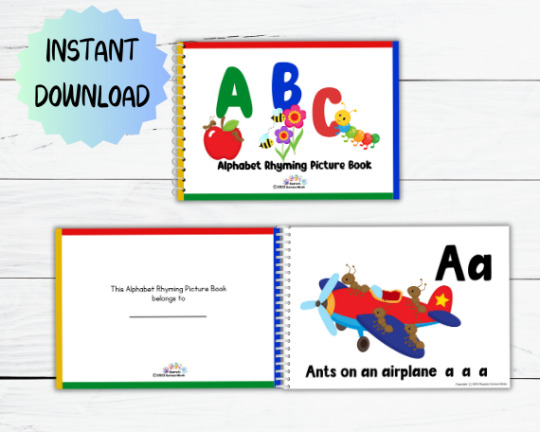
Building Strong Foundations
Phonics, the method of teaching children to connect letters with their corresponding sounds, helps build strong foundational literacy skills. This approach empowers children to decode words and understand how language works. By mastering the relationship between letters and sounds, children can read unfamiliar words and develop confidence in their reading abilities.
Improved Reading Comprehension
Learning to read through letters and sounds enhances reading comprehension. When children can sound out words, they gain a deeper understanding of the text they are reading. This understanding extends beyond simple word recognition to comprehension, as they can grasp the meaning of the words and the context in which they are used. This comprehension is vital for academic success across all subjects.
Increased Vocabulary
Phonics-based reading instruction contributes significantly to a child's vocabulary development. As children learn to read, they encounter new words regularly. When they can decode these words using phonics skills, they expand their vocabulary effortlessly. A rich vocabulary not only aids in reading but also boosts overall communication skills.
Enhanced Spelling Skills
Teaching children to read through letters and sounds goes hand in hand with improving their spelling abilities. When children understand the relationship between letters and their sounds, they can apply this knowledge to spell words correctly. This skill is invaluable throughout their academic journey and life beyond the classroom.
Encouraging a Love for Reading
Phonics-based reading instruction can help cultivate a lifelong love for reading. When children can read independently and enjoyably, they are more likely to choose books as a source of entertainment and knowledge. This love for reading not only enriches their lives but also supports their ongoing learning and personal development.
Enhanced Confidence
Reading can be a daunting task for children who struggle with it. Phonics instruction provides them with a structured approach that builds confidence. As they successfully decode words and read fluently, they gain a sense of accomplishment that motivates them to continue improving their reading skills.
Individualized Learning
One of the strengths of teaching children to read through letters and sounds is its adaptability to individual learning styles and paces. Each child progresses differently, and phonics instruction can be tailored to their specific needs. This personalized approach ensures that no child is left behind and that struggling readers receive the support they require.
Better Preparedness for Academic Success
The ability to read proficiently is a critical factor in a child's academic success. When children learn to read through letters and sounds, they are better prepared for success in all subject areas. Reading is the gateway to learning, and a strong foundation in reading skills sets the stage for future achievements in school and beyond.
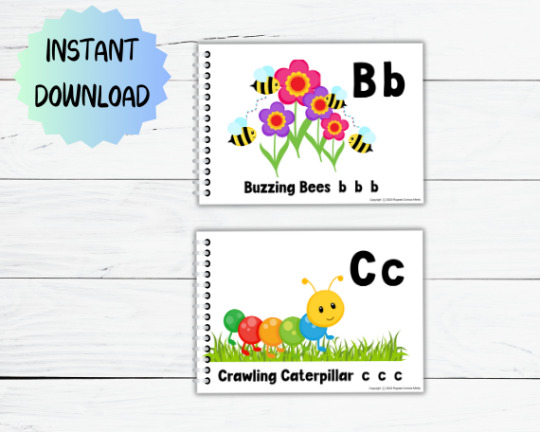
Teaching children to read through letters and sounds, or phonics, is a powerful method that provides them with essential skills for life. It builds strong foundations, enhances comprehension, expands vocabulary, and boosts confidence. Moreover, it instils a lifelong love for reading and prepares children for academic success. As parents and educators, it is crucial to recognize the importance of phonics-based reading instruction and provide children with the tools they need to become confident and proficient readers. In doing so, we empower them to unlock a world of knowledge and imagination through the magic of words.
#learn phonics#phonics sound#phonics#phonics chart#basic phonics#phonics prounciation#study phonics#phonics reading#phonics sheet#Kindergarten Chart#Kindergarten Phonics#alphabetic language#phonics syllables#Pink are vowels#Cream are consonants#Letter cards#Home school#portable set#Fundations letters#Fundations alphabet#Letter names#Letter sounds#ABC cards#Laminated#Cream and ivory#ABC Flashcards
5 notes
·
View notes
Text
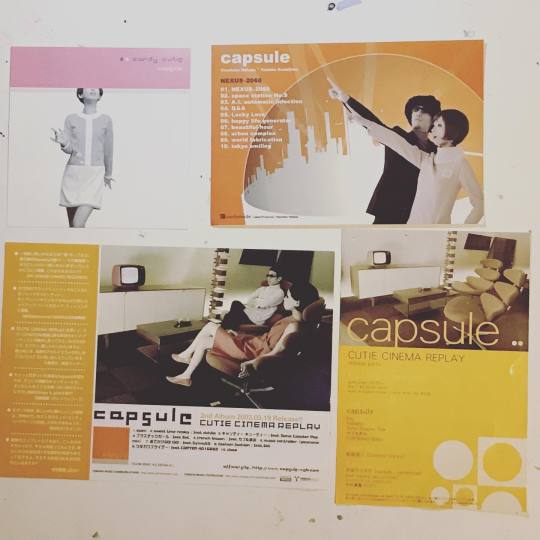
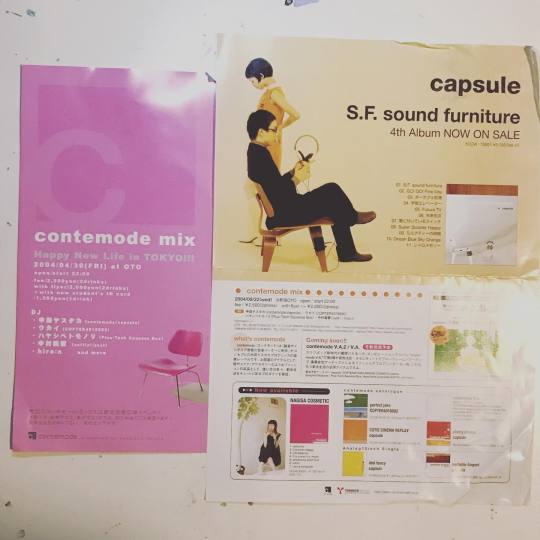
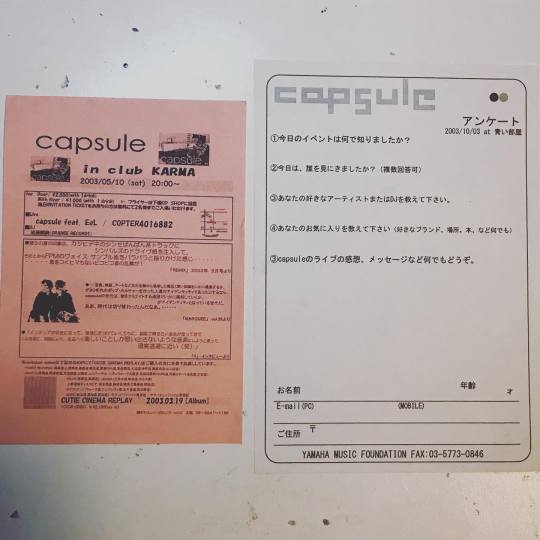
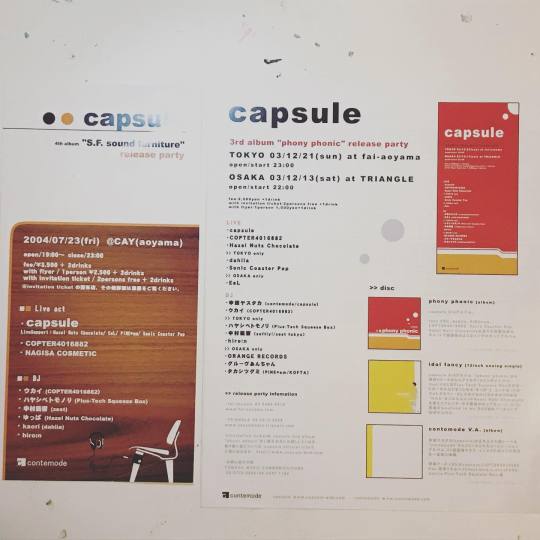

An assortment of capsule flyers from 2002-2004
#capsule#koshijima toshiko#nakata yasutaka#CUTIE CINEMA REPLAY#phony phonic#S.F. sound furniture#contemode#contemode V.A.#2002#2003#2004#contemode mix#contemode saloon
179 notes
·
View notes
Text
I packed myself lunch for school today and I feel like such a six year old. Like omg yay I have my pb&j and my goldfish and my applesauce, I can't wait to go to class and learn about word sounds!
#that is the exact meal i packed#and im going to my phonology class. which is about word sounds#what is the difference between a grad student in linguistics and a first grader in a phonics class
84 notes
·
View notes
Text
Writing feels soooo good in your brain. Has anyone invented a way that makes it not literally the most impossible thing in the world
#literally it’s so difficult you’re toiling for hours and then the output is like a couple paragraphs that sound like they’ve been plucked#from a phonics reader
47 notes
·
View notes
Text
(about the previous post I reblogged).
So a really big thing about me (which is much more obvious if you know me in real life, and thus know my real name) is that I have issues with people mispronouncing it.
A lot of my siblings have to deal with this, simply because of growing up as the kids of immigrants in a mostly-white town, and having very "not-white" names. We all deal with it in different ways.
This was the source of most of my issues in Kindergarten. It's one understandable thing when the other kids can't say your name (after all, they're still developing their talking abilities). But it's a very different thing when you tell them a hundred times how to say your name (in a way that should be easy enough, you would think), and they keep on butchering it beyond recognition.
To be fair, my name has certain letter-sounds that don't actually exist in English. As a result, depending on what accent you are hearing it from, it sounds kinda like one of 2 English letters, or a mix of the two (although really, it's kind of a completely different category of sound). So as long as the person is pronouncing the rest of the name accurately, it's alright.
However, because of me going easier in that regard, I get really, really bugged when people still ask for some sort of short form or more English-ified nickname or something. Like, buddy, I already told you that nickname. It's what I just introduced myself as: (insert my real name but with a heavy north-american accent here).
And then I also get bugged when people of the same cultural background as me use the "most English-ified" pronunciation. I know for a fact that they can say it properly. Why aren't they?
And then I get these really difficult-to-explain feelings when I meet someone who does actually end up saying it right. You know, it's that feeling when the substitute teacher apologizes in advance, but still manages to pronounce your name perfectly on the first try during attendance. Or when you and your siblings have a mutual friend, and the friend finds out how to say your name properly from your sibling, and seems genuinely sad that I didn't correct them earlier.
Anyway, I guess this is all part of why I've gotten really attached to the nickname 2030 here. You can't mispronounce the letters when there are no letters to mispronounce.
#my random brain#anyway for the record. my sister has that same non-english letter sound in her name#and her tactic is to just lecture them to death about foreign phonics until they get it right#which seems a bit too aggressive and energy-consuming to me. but also? seems to be super effective? so more power to her#then two of my brothers just flip the script and make up increasingly random nicknames for each other that only they can use#it's their unique sibling communication
3 notes
·
View notes
Note
Ditching phonics makes no sense! I learnt to read full novels in 4 months and read Lord of the Rings when others were struggling with early learner books. Why do schools allow ideologues render so many children illiterate?
It's really wierd. "Whole word"/"whole language"/"three-cueing" functions as a kind of ideology and worldview. It's not based on anything demonstrably true about how people learn to read, and adherents cling to it with resolute faith.
It seems to comprise part of a larger philosophy that teachers actually teaching, and students actually learning, useful skills like the alphabet, how to read, how to add and multiply, is oppressive, limiting and "rote learning." And we should instead open up the world to kids to just let them absorb all this stuff and figure it out for themselves. Just show them how fulfilling, how great reading is, and they'll pick it up on their own. It feels nice to these people. Which, of course, is the most important thing. Not working with kids through the hard process of building a life skill that could make or break their future.
Two thirds of American Ed School professors teach the homeopathy of "Whole Word," aka "Three-Cueing" to their classes of future teachers. And I say "homeopathy" deliberately, in that "whole word" crusaders believe kids magically absorb reading in the same way homeopaths believe water magically absorbs the properties of other chemicals.
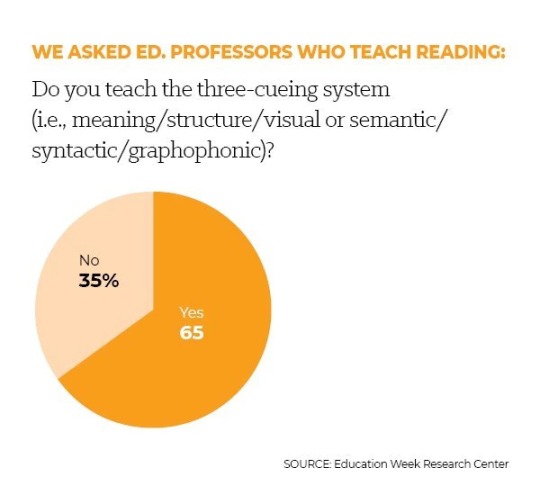
This is like two thirds of geography teachers teaching that the Earth is flat, or two thirds of chemistry teachers teaching about how you should stay away from "chemicals."
https://en.wikipedia.org/wiki/Reading#Whole_language
In his 2009 book, Reading in the Brain, cognitive neuroscientist, Stanislas Dehaene, said "cognitive psychology directly refutes any notion of teaching via a 'global' or 'whole language' method". He goes on to talk about "the myth of whole-word reading", saying it has been refuted by recent experiments. "We do not recognize a printed word through a holistic grasping of its contours, because our brain breaks it down into letters and graphemes". In addition, cognitive neuroscientist Mark Seidenberg, in his 2017 book Language at the Speed of Sight, refers to whole language as a "theoretical zombie" because it persists in spite of a lack of supporting evidence.
This is from the US government's Nation's Report Card website.

[ Note: This is part of a larger infographic; I trimmed it down to include just reading and writing. You can see the whole thing at the original website. ]
It's minority and underprivileged kids who suffer from this reading woo because they may not have as many books at home, may not have as stable a home life, might not have family members who can take the time to spend on the alphabet or reading practice if, for example, it's a single-parent household with a parent holding down two jobs to make ends meet. Or didn't learn to read properly themselves. These are kinds of considerations that grifters like Kendi and DiAngelo never factor into their sweeping narratives of systemic this and that. And cast you as a bigot for even suggesting.
How about, before implementing the toxic poison of the tenets of Critical Race Theory, you actually teach the kids to read? How about before implementing divisive oppressor-vs-oppressed programs of unsubstantiated postmodern philosophy in Kindergarten, you teach the alphabet and then see what sort of life success your students get.
As Roland Fryer remarked:
"I've been in fifth grade classrooms in which they're still learning the clock, and how to tell time, in fifth grade. I told the principal, if they can't tell time, at this point, they'll have no place to be on time for."
What's further difficult to stomach is that this has been known for over 60 years.
https://en.wikipedia.org/wiki/Why_Johnny_Can%27t_Read
Why Johnny Can't Read—And What You Can Do About It is a 1955 book-length exposé on American reading education by Rudolf Flesch. It was an immediate bestseller for 37 weeks and became an educational cause célèbre.
In this book, the author concluded that the whole-word (look-say) method was ineffective because it lacked phonics training. In addition, Flesch was critical of the simple stories and limited text and vocabulary in the Dick and Jane style readers that taught students to read through word memorization. Flesch also believed that the look-say method did not properly prepare students to read more complex materials in the upper grade levels.
Just think about that. For over sixty years, many kids have been taught to read using known substandard, ineffective methods, and any success they had was in spite of that teaching, not because of it.
Think of how many kids dropped out of school or did poorly because they were frustrated by not being able to fully participate, or concluded that school wasn't for them because they couldn't "get it." Who watched more advantaged kids streak ahead of them, thinking that there was something wrong with them. And if you can't read, how well can you possibly write?
Think of how many underprivileged kids perpetuated a cycle of dropping out of school, possibly early or single parenthood, low income prospects or even crime, and eventually unable to help their own kids learn to read properly, because the school will not. On the basis of an unevidenced ideology that asserts that "learning to read English comes naturally to humans, especially young children, in the same way that learning to speak develops naturally."
https://en.wikipedia.org/wiki/Whole_language#State_of_the_debate
One neuroscientist, Mark Seidenberg, says "[Whole-language quack Ken] Goodman's guessing game theory was grievously wrong" and "the impact was enormous and continues to be felt". When it come to evidence supporting the whole-language theory, he emphatically states "There wasn't any".
Dr. Lyell Asher goes into this in a segment of his larger series. Part 12 is specifically about "The Reading Debacle," but Part 11, "The Knowledge Gap," gives some important background that explains the criticality of literacy.
youtube
youtube
Other people like Emily Hanford and Belinda Luscombe have been writing about this as well.
It's amazing that something so fundamental could become yet another ideological warzone, with kids caught in the crossfire.
#ask#science of reading#phonics#reading#literacy#basic literacy#sound it out#whole word method#whole language method#corruption of education#education#pseudoscience
65 notes
·
View notes
Text
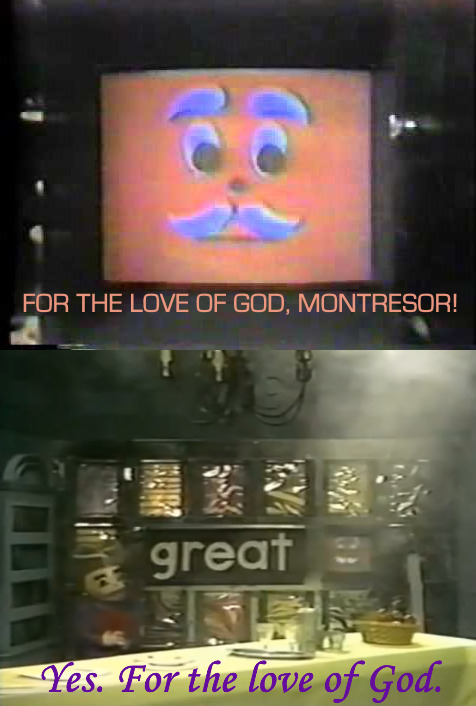
I *just* realized that Gregg Berger aka Cornfed Pig from Duckman aka Jecht from Final Fantasy X aka Cutthroat Bill from Curse of Monkey Island... also worked on the widely syndicated, St. Louis-produced PBS phonics show "The Letter People," which taught me to read by the time I was three.
In addition to playing several letter people himself (including Mr. V, the smoothest, suavest motherfucker in the alphabet in his Violet Velvet Vest), he also had a standout performance as the poor experimental word machine that Miss O fucking tortured by forcing it to try applying conventional short vowel logic to words like "cold" or "to" or "word" despite his literal *constant* pleas for her to stop as he belches smoke all over the laboratory. Girlboss gets the goods as usual.
It's all on YouTube. Seriously, check out that Mr. V episode. Wait for his introductory song to wrap up, then listen as that velvety sum'bitch learns your ass on what the voiced labiodental fricative is all about.
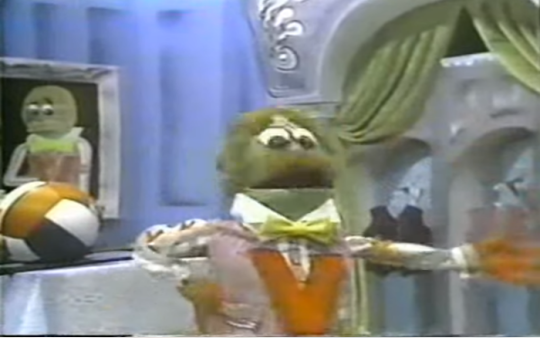
#the letter people#letter people#KETC#channel 9#st. louis#PBS#PBS kids#1970s#gregg berger#cornfed pig#jecht#final fantasy x#monkey island#duckman#he also played Mr. V and Mr. Z#violet velvet vest and/or voice#zipping uh... zippers. there. we got it.#Miss O#her sound is the same sound that starts “obstinate”#seriously that's canon; it's 1975#word machine#runaway words#abcd#follow me#phonics#70s nostalgia#80s nostalgia#1980s#edgar allan poe#the cask of amontillado
2 notes
·
View notes
Video
youtube
Phonics Song with TWO Words - A For Apple - ABC Alphabet Songs with Sounds for Children
https://www.youtube.com/watch?v=7UWxL6XDIQg
#youtube#abc#abc song#abc song for kids#phonics song#phonics song for children#two words song#phonics song two words#abc alphabet#alphabet song#alphabet sounds#abc phonics song#english phonics song#10 kids tv#10kidstv
4 notes
·
View notes
Text
actually balanced literacy is bad if half the kids in my first grade classes leave kindergarten unable to read CVC words
#yeah english may have an opaque orthography but PHONICS ARE STILL THE FOUNDATION OF LANGUAGE#these kids come to me with NO phonemic awareness#rhyme? ive never met her.#ending sounds? LMAO
20 notes
·
View notes
Text
It took me so long to stop reading RIIZE as "reez" instead of "ryze" and now I can only read BRIIZE as "bryze" even though it's "breeze" and like why couldn't we just pick one sound and stick to it BRUH
#I am not hooked on phonics I am tired#too bad suns got booted but I get it ig#riize#mine#it's way too late for this but like. shines? we could've been RIIZE and shines u feel me#but that sounds too much like shinee so alas
5 notes
·
View notes
Text
my international school background is doing me no favors here my biology teacher was indian my geography teacher was scottish my business teacher was from turkey i have no idea how to pronounce things anymore. why are you asking me how to say cot. who the fuck uses a cot
#the ho rambles#though i am glad to have three different languages to reference. had no idea there were so many subtle differences between vowels tbh#btw this is just cementing my teenage suspicion that teaching phonics to children is actually a daunting task lmao#i only vaguely remember long vowels and short vowels like what child knows wtf a schwa is lmao#and how the r at the end of a vowel changes the sound?#like dude if you're not fortunate enough to be immersed in the language and. yknow. just acquire it#it's actually really hard to learn systematically
3 notes
·
View notes
Text
i do think it is a hate crime that we never heard Keith speaking Korean in a texas cowboy accent.
#idk how korean sounds when it's westernized but i know for a fact that japanese sounds INCREDIBLE with a western accent so i imagine it's#similar#like cmon#i just saw steve yeun in a kdrama and i was POUNDING MY FIST ON THE TABLE IN RAGE#he sounds so fucking good one of the best VAs i know by name#like wtfffffff#that's all the entire voltron fandom ever wanted-- was for keith to speak in a cowboy accent or in korean#LIKE#im pretty sure he isnt even korean in voltron he's actually japanese like shiro#because ko ga and ne are all phonics in japanese so it just makes more sense even his name is more japanese than korean#but at the same time#steven yeun
19 notes
·
View notes
Text
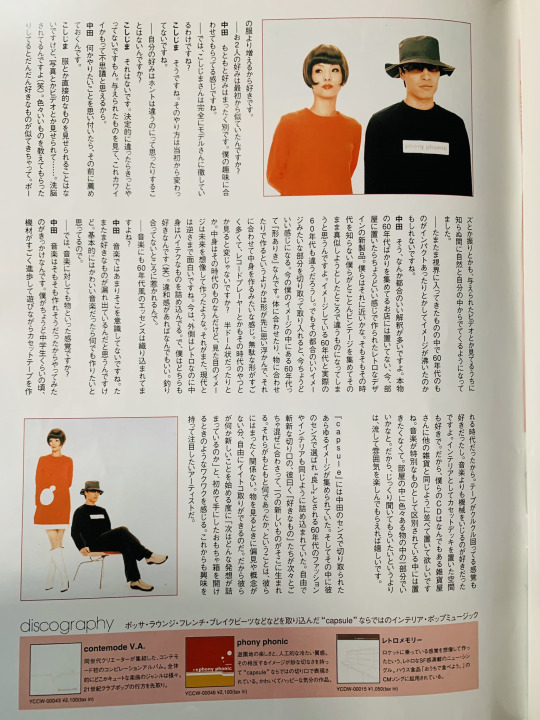

[Translation] capsule in girls '60s magazine (Feb. 2004)
When I first saw their music videos, the striking visuals immediately caught my eye. Simplistic designs, vivid color schemes on the outfits and sets… I can't describe the style as anything other than '60s-inspired. For the first edition of our "Pick Up Artist" feature, it's one whose existence fascinates me — let's take a look at the charm of capsule.
capsule is a music unit consisting of Nakata Yasutaka, whom manages the sound, art direction, design, concept work and so on, and vocalist Koshijima Toshiko. Nakata directs the image, visual aspects, and songs while Koshijima performs it all, resulting in their unique style.
- original interview by Aikawa Chisato, translation by ystk-archive -
The reason behind their '60s-inspired visual style
Nakata: To be honest, I don't have any particular attachment to the '60s. I just like unique and minimalistic things, stuff with interesting shapes and clean designs and whatnot. It started when I got into interior design, and at first I especially liked Space Age furniture.¹ That's changed a little recently — I like pieces made out of wood but still with that outerspace kind of vibe. Even when it's made from wood, it doesn't feel natural, it still has this sort of odd look. When it comes to the '60s, I like the plywood that they often used. But I'm intrigued by Karimoku furniture too (laughs).²
— So would you say you're more interested in space and not the '60s?
Nakata: Yeah, and I guess sci-fi movies played a part in that. In movies like Men in Black you often see Tulip chairs, though I don't think they were used to evoke a retro or '60s feel on purpose.³ With films like that I tend to focus more on the furniture and not the overall atmosphere; if anything, I see furniture along with fashion as objects that look nice when put into a scene you're taking in as a whole. I like to come up with unconventional settings. Women are usually depicted in sci-fi films as secretaries, all wearing identical wigs and uniforms, and I like that kind of weird atmosphere. So instead of me consciously liking '60s aesthetics, I wound up thinking they were cool without making the connection that they were from that decade. I also love clothes that incorporate simplistic, striking designs, since they're like spacesuits (laughs).
— How do you feel about wearing clothes like that?
Koshijima: I'm also not obsessed with the '60s or anything, but I like to play around with that era's clothing and makeup styles. It's more fun than just wearing normal clothes.
— Have you two had similar tastes all along?
Nakata: Our tastes used to be completely different. I feel like she's adjusted to match me.
— So Koshijima-san is committed to being a model?
Koshijima: Yep. I haven't changed my approach, ever since the beginning.
— Are there times where you feel like your tastes really are different?
Koshijima: I don't think so. If we actually were fundamentally different, I don't think we'd be working together. Strangely enough, when I look at the materials I'm given, I start to think they're cute.
Nakata: When I get an idea, I suggest it first.
Koshijima: But he doesn't show me clothes or anything directly, instead he shows me photos and videos… Like I'm being brainwashed (laughs). The more he introduces me to all kinds of cool things, the more similar we become. After I watched the materials he gave me, poses and dance moves just started coming naturally to me without even realizing it.
— Maybe you ran across something from the '60s that left an impression and that ended up coming through in your image.
Nakata: Yeah, there are a lot of easy explanations for it. I wonder if we're more like a new product with a retro design that would fit nicely in someone's living room, rather than something that could be found in an authentic '60s vintage shop. I think even if we intentionally collected oldschool aesthetics from that era and tried to copy those, it'd still turn out differently, because peoples' concept of the '60s and the real '60s are two different things. But if you take parts of that concept people have of that decade and use them, you wind up with something that has the right feel to it. For me right now, the concept I have in mind is the "style" of the '60s. Instead of making clothes or objects to match up with the '60s aesthetic, the styles are already floating around in my head, and then I make content that reflects that. There were a lot of useless shapes — like aren't record players from back then weird-looking? The technology of them and the half-dome shape are of that time, but the way they look on the outside is as if someone was imagining the future while designing them. It's interesting how these days it's the opposite: now the exterior designs of things are retro while the tech inside is highly advanced. And I like both (laughs). I even like things that seem out of place. I'm drawn to a sense of disharmony.
— Would you say the essence of the '60s is woven into your music?
Nakata: Not intentionally. I think the things I like tend to show through my music on accident. Basically I want to make any music, as long as it's cute.
— So do you feel like music is essentially an object?
Nakata: Music is something I started doing because I thought I could create it. It was right when I was in junior high school, they'd made a lot of progress with technology so making cassette tapes became fun. Part of that was because I liked the feeling of winding a tape up. I liked playing around with machines more than the music aspect itself and, when it comes to decorating, I even like the look of a tape deck sitting in a room. So that's why I want our CDs to be sold in regular stores along with other kinds of merchandise. I don't think music should be classified as something special and separate; it's good if it's just one part of the total amount of belongings in a space. Rather than wanting people to listen to our music seriously, I'd be happy if they enjoy the atmosphere it gives when they play it out in the open.
¹ Space Age design was characterized by "sleek, aerodynamic lines and geometric forms," "dominated by bright, bold hues" and was often constructed of manmade materials such as plastic. You can read more about it here.
² Karimoku is a Japanese brand of all-wood furniture boasting superior craftsmanship. You can read more about it and look at examples here.
³ This is the famous Tulip chair.
#nakata yasutaka#koshijima toshiko#capsule#girls '60s#phony phonic#S.F. sound furniture#Retro Memory#2004#magazines#interviews#translations
44 notes
·
View notes
Text
my kids are not gonna have phones til they’re like 13 or until they are going out with their friends without parent supervision. they can have like ipod touches or whatever to tide them over but no maam i am not having jam handed ipad obsessed mouth breather kids. they better open up a book and create vast worlds in their minds eyes. i just want my kids to be curious and creative, not idle consumers
#and omg that article basically about how phonics hasn’t been taught in nyc public schools for 20 years….#best believe my kids will be able to SOUND IT OUT
10 notes
·
View notes
Text
ABC Song | Fun ABC Animal Songs for Kids | Learn A to Z Animal Names
Description: Welcome to our Fun ABC Animal Songs for Kids video! In this video, your child will learn A to Z animal names with fun nursery rhymes and animal sounds. Our catchy songs and colorful animations will keep your child engaged and entertained while they learn. Watch now and let your child discover the amazing world of animals!
youtube
#phonics#song#phonics song#phonics songs#learn#abc song#abc songs for children#Children's Song#sounds#Animation#Cartoon#Songs#education#preschool#Animated#Song#alphabets#nursery rhyme#music#children#kids songs#songs for children#kids#music for children#children songs#alphabet songs for children#School#Word#abc phonics song#Alphabet Song
2 notes
·
View notes
Text
also if anyone wants to talk to me about the science of reading my mom just explained it to me so I get it.
#SORRYYYY for thinking context and structure are important to reading AS well as phonics!!#if you ONLY want to teach kids phonics you’re going to have kids that can PONOUNCE things but have Noooooooo Reading Comprehension.#emily hanford!!!!! and you will also! have kids that hate reading! because reading is really boring if you’re just#focusing on letters and not the storyyyyyyyyyy!!!!!!#like don’t get my wrong. phonics is great. i love phonics. i took all my social science requirements in linguistics and speech sounds.#but you know what else is great???? getting meaning from text!! making inferences and predictions!!! actually thinking about the story!!!#i could read all of les mis to you in the original french but i wouldn’t understand more than 10% of it!
5 notes
·
View notes